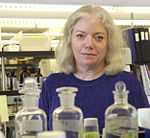C. Sue Carter
| C. Sue Carter | |
|---|---|
 | |
| Born | San Francisco, California, USA |
| Residence | Bloomington, Indiana |
| Nationality | American |
| Fields | Behavioral neuroscience |
| Institutions | The Kinsey Institute (Director) |
| Alma mater | University of Arkansas, Fayetteville, Arkansas; USA |
| Known for | Characterizing the role of Oxytocin and Vasopressin in the Neurobiology of Monogamy and Love |
| Notable awards | American Association for the Advancement of Science |
C. Sue Carter is a biologist and behavioral neurobiologist. She is an internationally recognized expert in behavioral neuroendocrinology. In 2014 she was appointed Director of The Kinsey Institute and Rudy Professor of Biology at Indiana University. Dr. Carter was the first person to identify the physiological mechanisms responsible for social monogamy.[1][2]
Background
Carter studied biology at Drury College in Springfield, Missouri. She completed a PhD in Zoology at the University of Arkansas in Fayetteville.
Carter is a Fellow of the American Association for the Advancement of Science.
She is married to Stephen Porges, and has two children: Eric Carter Porges (currently a graduate student at the University of Chicago in Integrative Neuroscience) in Jean Decety's Social Cognitive Neuroscience Laboratory, and Seth Porges (currently an editor at Maxim Magazine in New York City, and previously an editor at Popular Mechanics Magazine).
Academic achievements
Carter studies social bonding, male and female parental behavior, the social control of stress reactivity and the social control of reproduction, often using animal models such as the socially monogamous prairie vole. Carter’s research focuses on neuropeptide and steroid hormones, including oxytocin, vasopressin, corticotropin-releasing hormone, and estrogen. Her research program has discovered important new developmental functions for oxytocin and vasopressin, and implicated these hormones in the regulation of long-lasting neural and effects of early social experiences.[3] She also has a long-standing concern regarding the consequences of medical manipulations for human development and parent-child interactions, including the use of “pitocin” to induce labor and consequences of breast feeding for the mother and child. Most recently she has been examining the role of oxytocin and vasopressin in mental disorders such as autism, schizophrenia, anxiety and depression.[4] Carter is also known for research on the physiological basis of social behavior, including studies that implicated oxytocin, vasopressin and hormones of the hypothalamic-pituitary-adrenal (“stress”) axis in the traits of monogamy including pair-bond formation.[5] She pioneered the physiological study of socially monogamous mammals, including the prairie vole. In collaboration with Lowell Getz, Carter documented the occurrence of social monogamy in prairie voles. Her studies in rodents helped to lay the foundation for the studies of behavioral and developmental effects of oxytocin and vasopressin in humans which are in progress. In collaboration with Margaret Altemus she conducted some of the first studies documenting the importance of breast-feeding in the regulation of maternal physiology.
Honors
Carter is a Fellow and Past-President of the International Behavioral Neuroscience Society[6] and a recipient of the Matthew J. Wayner-NNOXe Pharmaceuticals Award for distinguished lifetime contributions to behavioral neuroscience.
References
- ↑ Winslow J.T., Hastings N., Carter C.S., Harbaugh C.R. & Insel T.R. (1993) Central vasopressin mediates pair bonding in the monogamous prairie vole, Nature 365: 545–548
- ↑ Insel T.R. & Carter C.S. (1995) The monogamous brain, Natural History 104: 12–14
- ↑ Carter C.S. & Ahnert L. (2005) Attachment and Bonding: A New Synthesis, MIT Press, Cambridge MA
- ↑ Goldman M., Marlow-O'Connor M., Torres I. & Carter C.S. (2008) Diminished plasma oxytocin in schizophrenic patients with neuroendocrine dysfunction and emotional deficits, Schizophrenia Research 98: 247–55
- ↑ Carter C.S. (1992) Oxytocin and sexual behavior, Neuroscience and Biobehavioral Reviews 16: 131–144
- ↑ "IBNS Past-Presidents". Retrieved 2009-03-24.
Selected publications
- Carter C.S., Getz L.L. (1993) Monogamy and the prairie vole, Scientific American 268: 100–106
- Carter C.S. & Keverne EB. (2002) The neurobiology of social affiliation and pair bonding, In Hormones, Brain and Behavior, edited by D. Pfaff, pp. 299–337, Academic Press, San Diego CA
- Carter C.S. (2003) Developmental consequences of oxytocin. Physiology and Behavior 79: 383–397
- Carter C.S. (2007) Sex differences in oxytocin and vasopressin: Implications for autism spectrum disorders?, Behavioural Brain Research. 176: 170–186
- Goldman M., Marlow-O'Connor M., Torres I., Carter C.S. (2008) Diminished plasma oxytocin in schizophrenic patients with neuroendocrine dysfunction and emotional deficits, Schizophrenia Research 98: 247–55
- Carter C.S., Grippo A.J., Pournajafi-Nazarloo H., Ruscio M.G., Porges S.W. (2008) Oxytocin, vasopressin and social behavior, Progress in Brain Research 170: 331–336
Books
- Carter C.S. (1974) Hormones and Sexual Behavior, Dowden, Hutchinson, & Ross, Inc., In Benchmark Papers in Animal Behavior series
- Carter C.S., Lederhendler I.I. & Kirkpatrick B. (1997) The Integrative Neurobiology of Affiliation, Annals of the New York Academy of Sciences 807 (Re-released by MIT Press, Cambridge, MA, 1999)
- Uvnas-Moberg, K. & Carter, C.S. (1998) Special issue of Psychoneuroendocrinology: Proceedings of a Conference Sponsored by the Wenner-Gren Foundation: Stockholm, Sweden entitled Is There a Neurobiology of Love?
- Cacciopo J., Berntson G.G., Adolphs R., Carter C.S., Davidson, J., McClintock, M.K., McEwen, B.S. Meaney, M.J., Schacter, D.L., Sternberg, E.M., Suomi, S.S. & Taylor, S.E. (2002) Foundations in Social Neuroscience, A Bradford Book, MIT Press, Cambridge MA
- Carter C.S., Ahnert L., Grossmann K., Hardy S.B., Lamb M., Porges S.W., & Sachser N. (eds.) (2005) Attachment and Bonding: A New Synthesis, MIT Press, Cambridge MA
See also
- Biological Psychology
- Psychiatry
- Neuroendocrinology
- Neuropeptides
- Neuroscience
- Love
- Evolution
- Social cognition
- Social Neuroscience